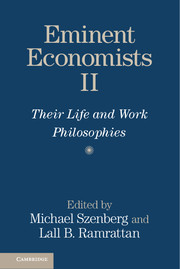Book contents
- Frontmatter
- Dedication
- Contents
- List of Contributors
- Foreword
- Preface and Acknowledgments
- Introduction
- 1 Being There: An Intellectual Journey
- 2 Social Norms in Economics and in the Economics Profession
- 3 Personal Reflections on My Professional Life
- 4 Gray Eminence?
- 5 Biochemist to Economist
- 6 Puzzles and Paradoxes: A Life in Applied Economics
- 7 Succeeding in Economics
- 8 My Research Strategy
- 9 My Philosophy of Economics, Life, and Everything (Not!)
- 10 Finding a Niche
- 11 Become an Economist – See the World
- 12 Practitioner of the Dismal Science? Who, Me? Couldn’t Be!!
- 13 One Job, Four Careers
- 14 My Life and Research Strategy
- 15 How I Ended Up Being a Multifaceted Economist and the Mentors I Have Had
- 16 Searching for My Personal Philosophy
- 17 Learning about the Evolving International Economy
- 18 Confessions of a Wellesley FEM
- 19 God, Ants, and Thomas Bayes
- 20 The Path of a Monetary Economist
- 21 Learning from the Field
- 22 Order in and through Disorder: The Invisible Hand as a Turbulent Regulator
- 23 The Education of an Economist
- 24 Faith, Science, and Religion
- 25 My Studies in International Economics
- 26 Sailing into the Wind
- 27 My Life and Work Philosophy
- 28 Scaling Fortress Economics
- 29 The Accidental Economist
- Index
- References
9 - My Philosophy of Economics, Life, and Everything (Not!)
Published online by Cambridge University Press: 05 June 2014
- Frontmatter
- Dedication
- Contents
- List of Contributors
- Foreword
- Preface and Acknowledgments
- Introduction
- 1 Being There: An Intellectual Journey
- 2 Social Norms in Economics and in the Economics Profession
- 3 Personal Reflections on My Professional Life
- 4 Gray Eminence?
- 5 Biochemist to Economist
- 6 Puzzles and Paradoxes: A Life in Applied Economics
- 7 Succeeding in Economics
- 8 My Research Strategy
- 9 My Philosophy of Economics, Life, and Everything (Not!)
- 10 Finding a Niche
- 11 Become an Economist – See the World
- 12 Practitioner of the Dismal Science? Who, Me? Couldn’t Be!!
- 13 One Job, Four Careers
- 14 My Life and Research Strategy
- 15 How I Ended Up Being a Multifaceted Economist and the Mentors I Have Had
- 16 Searching for My Personal Philosophy
- 17 Learning about the Evolving International Economy
- 18 Confessions of a Wellesley FEM
- 19 God, Ants, and Thomas Bayes
- 20 The Path of a Monetary Economist
- 21 Learning from the Field
- 22 Order in and through Disorder: The Invisible Hand as a Turbulent Regulator
- 23 The Education of an Economist
- 24 Faith, Science, and Religion
- 25 My Studies in International Economics
- 26 Sailing into the Wind
- 27 My Life and Work Philosophy
- 28 Scaling Fortress Economics
- 29 The Accidental Economist
- Index
- References
Summary
In Douglas Adams’s brilliant science fiction parody, The Hitchhiker’s Guide to the Galaxy, “a race of hyperintelligent pandimensional beings ... built themselves a super computer ... the size of a small city.” The single task assigned to this computer, which was named Deep Thought, was to provide “the Answer” to “the ultimate question of Life, the Universe, and Everything.” After 7.5 million years of work, it came up with the answer: 42.
I thought of this when the editors asked me to write about “my life philosophy ... interspersed with social philosophical issues, some perspective on the nature of life and of the universe, and the relationship between economics and other disciplines.” It took me less than 7.5 million years to come up with the answer: 23.
When the hyperintelligent beings complained, “Is that all you’ve got to show for seven and a half million years’ work?” Deep h ought replied, “I think the problem . . . is that you’ve never actually known what the question is.” My assignment is similarly vague. Deep thought told the hyperintelligent beings that they should construct an even larger computer to calculate “the Question to the Ultimate Answer.” I will not set the editors such a daunting task. I will merely make a few random remarks that may help sharpen the question. h ey may not, but what do you expect at er far less than 7.5 million years’ worth of shallow thought, coming from a far-from super computer who occupies barely two square feet of space?
- Type
- Chapter
- Information
- Eminent Economists IITheir Life and Work Philosophies, pp. 118 - 128Publisher: Cambridge University PressPrint publication year: 2014



